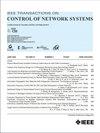Consensus of High-Order Multiagent Systems With Binary-Valued Communications and Switching Topologies
IF 4
3区 计算机科学
Q2 AUTOMATION & CONTROL SYSTEMS
引用次数: 0
Abstract
This article studies the consensus problem of high-order multiagent systems (MASs) with binary-valued communications and switching topologies. To tackle the challenge of unknown states caused by binary-valued communications, this article constructs an estimation-based consensus algorithm. First, a recursive projection identification algorithm is presented to estimate the neighbors' states dynamically. Then, based on these estimates, a consensus law is designed. By constructing and analyzing two combined Lyapunov functions about estimation error and state error, this article establishes their relation to overcome the difficulty resulting from the coupling of the estimation and control and less information due to switching topologies. Under the condition of jointly connected topologies, it is proven that by properly selecting the step coefficient, the estimates of states can converge to the true states with a convergence rate as the reciprocal of the recursion times. Besides, the MAS is proved to achieve weak consensus and the consensus rate is also established as the reciprocal of the recursion times. Finally, a simulation example is given to validate the algorithm.具有二值通信和交换拓扑的高阶多智能体系统的一致性
研究了具有二值通信和交换拓扑的高阶多智能体系统的一致性问题。为了解决二值通信带来的未知状态挑战,本文构建了一种基于估计的一致性算法。首先,提出了一种递归投影识别算法来动态估计邻域的状态。然后,基于这些估计,设计共识法。本文通过构造和分析关于估计误差和状态误差的两个组合Lyapunov函数,建立了它们之间的关系,克服了由于估计和控制的耦合以及切换拓扑导致的信息少的困难。证明了在联合连通拓扑条件下,通过适当选择阶跃系数,状态估计可以收敛到真状态,收敛速率为递推次数的倒数。此外,还证明了MAS可以实现弱共识,并建立了共识率为递归次数的倒数。最后给出了仿真算例,验证了算法的有效性。
本文章由计算机程序翻译,如有差异,请以英文原文为准。
求助全文
约1分钟内获得全文
求助全文
来源期刊

IEEE Transactions on Control of Network Systems
Mathematics-Control and Optimization
CiteScore
7.80
自引率
7.10%
发文量
169
期刊介绍:
The IEEE Transactions on Control of Network Systems is committed to the timely publication of high-impact papers at the intersection of control systems and network science. In particular, the journal addresses research on the analysis, design and implementation of networked control systems, as well as control over networks. Relevant work includes the full spectrum from basic research on control systems to the design of engineering solutions for automatic control of, and over, networks. The topics covered by this journal include: Coordinated control and estimation over networks, Control and computation over sensor networks, Control under communication constraints, Control and performance analysis issues that arise in the dynamics of networks used in application areas such as communications, computers, transportation, manufacturing, Web ranking and aggregation, social networks, biology, power systems, economics, Synchronization of activities across a controlled network, Stability analysis of controlled networks, Analysis of networks as hybrid dynamical systems.
 求助内容:
求助内容: 应助结果提醒方式:
应助结果提醒方式:


